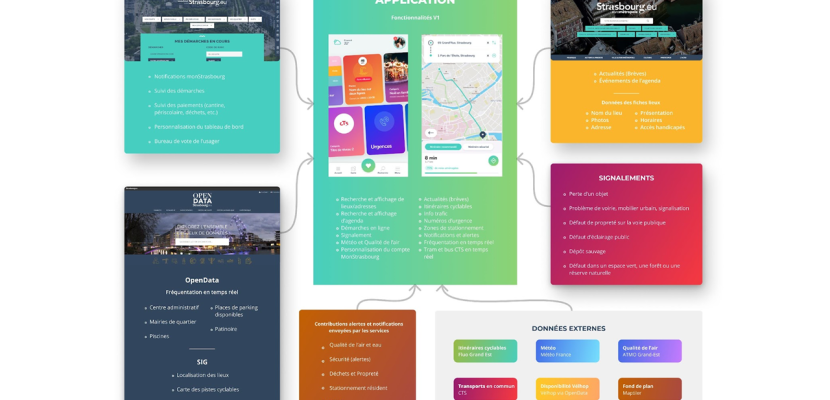
“Stras’app” A service to simplify everyday life citizens

About this good practice
In 2019, Eurometropole residents looking for air quality, timetables for different means of transport (bus, tram, train), cultural and sports facilities (swimming pools, media libraries, etc.), car parks, or wishing to carry out certain administrative formalities, had to search for information on different websites or go on site.
- Timetable information was not updated. People faced closed doors, waited for buses or trams that were cancelled.
- Municipal facilities (swimming pools, waste collection centres, etc.) and services often face peak times difficult to manage.
- Citizens had to carry several passes to use the various services (transport, media library, etc.).
- Administrative procedures had to be carried out by post or on site...
With a growing population, the need to facilitate modal shifts to relieve traffic congestion and improve air quality, waste sorting and reduce the impact on the environment, was strong.
In the context of the Grand Est's MOBILITY COORDINATION POLICIES, the city organized a service supported by an app, enabling Citizens to find out in real time the best multimodal travel experience, best time to get to the town hall, swimming pool, spaces available in car parks. Notifications also warn of a delay in waste collection, traffic information or pollution peak alerts. Linked to “MonStrasbourg account”, StrasApp facilitates administrative procedures in real time (track progress, notify expiry date of media library loans or resident parking permit).
Expert opinion
Resources needed
The app costs 300k€, coherent OD databases in 20 public services. 84% of the code has been developed by 1.5 employee during 18 months (90k€) using the Flutter cross-platform frameworks (for Android, iOS, and web) saving multiple platform costs and enabling a min 5 years viability.
Evidence of success
The app has been downloaded by + 10% of the 550k inhabitants (+100k in 2024).
It has improved the well-being of residents by:
- improving city services (by aggregating objects via geolocation on a single channel, such as glass deposits)
- personalising services
- Smoothing out the use of sports and cultural services, saving time and travel
- Helping to decide on the best means of transport, which: - saves energy. - limits the number of physical tickets - Encourages the use of public transport.
Potential for learning or transfer
Replicability:
The application is easily replicable. To integrate OD from +20 services, an effort needs to be made to set up:
- a directory compiling all the places of interest and all the events diaries
- Single sign-on (SSO), to enable user connection to several applications and websites with a single sign-on.
- Mature data governance: all the services involved must publish their OD according to the same high quality standard.
Sustainability:
It will be easy to improve data visualisation, given that the application is based on recent hybrid technology.
Replication observed: This application has served as an example for the development of the FLUO app (Regional MaaS based on OD). It is also an example for the intermodality and user services charter, through which the Region is pursuing: to strengthen the coherence of transport policies, to develop mobility services and innovations, and collectively steer the implementation of decisions.
